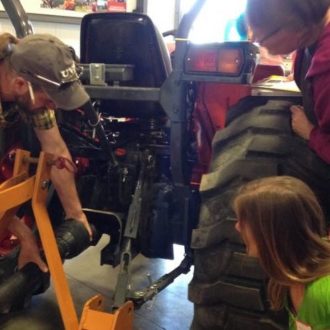Unskilled farm equipment operation can put farmers at serious physical and financial risk. Lack of knowledge about this equipment can limit farm scale and productivity, and therefore the farm’s ability to provide a sustainable family income. Yet new farmers (including apprentices, interns and employees) increasingly come from non-farm backgrounds and have limited experience with machinery. Moreover, in many places in the Northeast, access to tractor and mechanization education and technical assistance is limited.
Therefore, this capacity-building project developed and implemented a collaborative model for providing tractor education to aspiring and beginning farmers and farm employees, apprentices and interns. It provided professional development to 43 agricultural service providers from around the Northeast — including representatives from Extension, agricultural nonprofit organizations and educational institutions, vocational/technical education center staff and experienced farmers—to deliver tractor and mechanization education that helps participants gain practical skills, realistically assess and communicate their equipment needs, and make informed decisions, all of which will help improve farmers’ efficiency, safety and satisfaction with their businesses.
Through online learning, hands-on training, and follow-up support, participants gained skills, knowledge and understanding, enabling them to offer meaningful and effective farm mechanization education for aspiring and beginning farmer audiences in the Northeast, which include many people from non-farm backgrounds who have limited experience with machines and equipment.
All of the 31 people who completed the professional development said it increased their ability to train and evaluate a new tractor operator. All 31 participants reported improving skills related to setting up and running hands-on tractor skill exercises, and teaching safe tractor PTO and equipment operation. Additionally, 30 of the participants improved skills related to teaching spotting and hitching, basic maintenance of tractors, implementing adult learning principles in education, selecting instructors and selecting equipment and facilities to use as training facilities.
